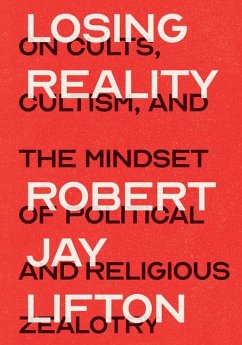A "fresh perspective" (Kirkus Reviews) on the psychology of zealotry, from a National Book Award winner and a leading authority on the nature of cults, political absolutism, and mind controlIn this unique and important volume Robert Jay Lifton, the National Book Award-winning psychiatrist, historian, and public intellectual, proposes a radical idea: that the psychological relationship between extremist political movements and fanatical religious cults may be much closer than anyone thought. Exploring the most extreme manifestations of human zealotry, Lifton highlights an array of leaders-from Mao to Hitler to the Japanese apocalyptic cult leader Shoko Asahara to Donald Trump-who have sought the control of human minds and the ownership of reality. Lifton has been called "one of the world's foremost thinkers on why we humans do such awful things to each other" (Bill Moyers) and his pioneering concept of the "Eight Deadly Sins" of ideological totalism-originally devised to identify "brainwashing" (or "thought reform") in political movements-has been widely quoted in writings about cults and embraced by members and former members of religious cults seeking to understand their experiences. In Losing Reality Lifton makes clear that the apocalyptic impulse-that of destroying the world in order to remake it in purified form-is not limited to religious groups but is prominent in extremist political movements such as Nazism and Chinese Communism, and also in groups surrounding Donald Trump, showing how this destructive desire ultimately reached its apotheosis in the January 6 Capitol insurrection. Lifton applies his concept of "malignant normality" to Trump's efforts to render his destructive falsehoods a routine part of American life. But Lifton nevertheless sees the human species as capable of "regaining reality" through our "protean" psychological capacities and our ability to serve as "witnessing professionals." Lifton weaves together some of his finest work with extensive new commentary to provide vital understanding of our struggle with mental predators. Losing Reality is a book not only of stunning scholarship, but also of increasing relevance for these troubled times.
Hinweis: Dieser Artikel kann nur an eine deutsche Lieferadresse ausgeliefert werden.
Hinweis: Dieser Artikel kann nur an eine deutsche Lieferadresse ausgeliefert werden.








